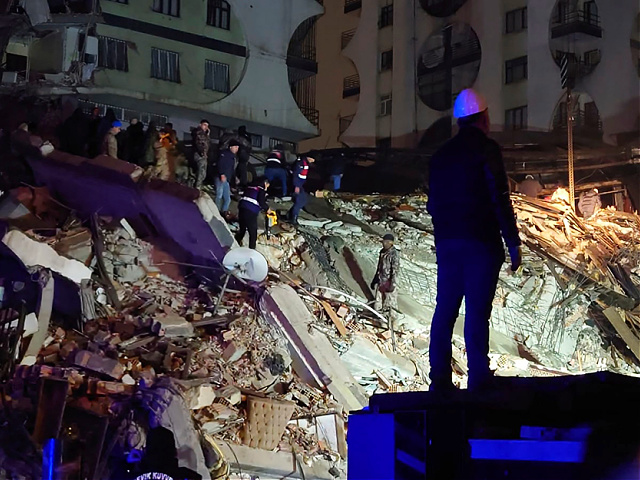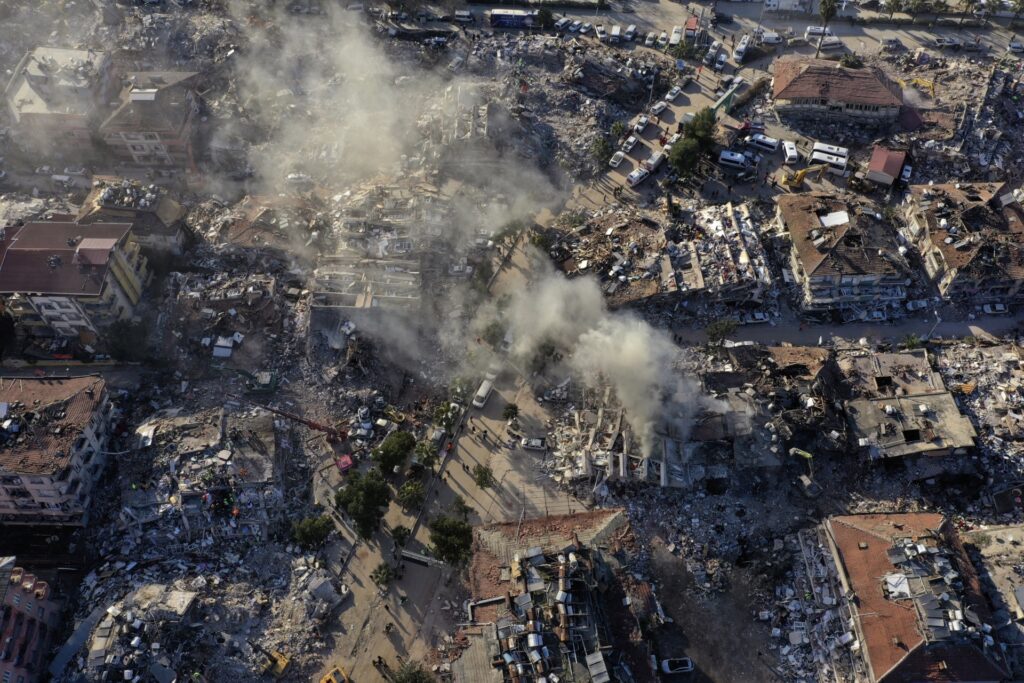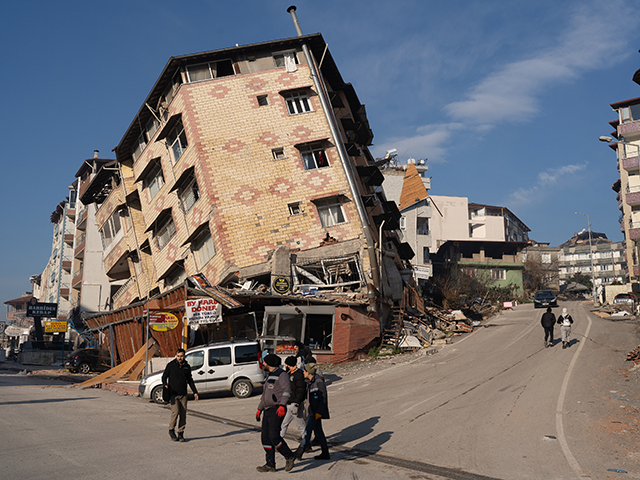The Turkish government pledged this week to investigate reports of negligent construction and maintenance in many of the buildings destroyed by Monday’s powerful earthquakes, whose death toll has now surpassed 22,000.
Turkish Justice Minister Bekir Bozdag said on Wednesday that the top priority was to “save people trapped under the rubble.”
Justice Minister Bekir Bozdağ says judicial process to be initiated for those engaged in construction-related negligence after recovery operationshttps://t.co/kh7MefIPN3
— DAILY SABAH (@DailySabah) February 9, 2023
“Then the judicial process will continue. The ones who committed negligence will be held accountable,” Bozdag said at a press conference in the hard-hit city of Diyarbakir, where at least seven buildings have completely collapsed.
University College London professor of emergency planning David Alexander told the Associated Press (AP) on Friday there could be quite a bit of negligence for Turkish authorities to investigate.
“This is a disaster caused by shoddy construction, not by an earthquake,” Alexander said, attributing some of the high death toll to lax enforcement of building codes and architects who ignored years of warnings from geologists not to build vulnerable structures in earthquake-prone areas.

People try to reach trapped residents in a collapsed building in Diyarbakir, southeastern Turkey, early Monday, February 6, 2023. (AP Photo/Mahmut Bozarsan)
Chamber of Architects of Turkey President Eyup Muhcu said it was “common knowledge” buildings in the quake zone were built with “weak” materials and did not measure up to standards, including buildings constructed after the devastating earthquake of 1999 led to a dramatic tightening of construction codes.
“Even though Turkey has, on paper, construction codes that meet current earthquake-engineering standards, they are too rarely enforced, explaining why thousands of buildings crumbled,” the AP noted.
“According to official estimates, 6,000 to 7,000 buildings collapsed on Monday. However strong, no earthquake could have caused this much damage if all buildings were up to standard,” civil engineer and Turkish Earthquake Retrofit Association President Sinan Turkkan told Al Jazeera News on Friday.
Why did so many buildings collapse in Turkey during the earthquake? ⤵️ https://t.co/CXFt6LUvDY
— Al Jazeera English (@AJEnglish) February 10, 2023
“This saddens me deeply as an engineer. If we managed to get everyone on board, we could have either reinforced or rebuilt all defective buildings in the past 20 years. We could have saved at least 5,000 of the buildings that we lost on Monday from complete destruction. We could have saved many, many lives,” Turkkan said.
“It is completely unacceptable for a public building, a power plant or an airport to collapse in an earthquake. There are very strict regulations in place to prevent this,” he added.

Turkish President Recep Tayyip Erdogan arrives for a ceremony, in Ankara, Turkey, on May 16, 2022. (AP Photo/Burhan Ozbilici)
Critics blamed President Recep Tayyip Erdogan, who has been in power for 20 years, for policies that allowed shoddy construction and negligent inspections.
Erdogan’s government actually issued a total “amnesty” for building code violations in 2018, allowing violators to simply pay a modest fine instead of fixing the problems. The government explained that amnesty was necessary because over half of the buildings in Turkey did not comply with current building standards, and many of the violations were precisely the sort of poor engineering that becomes deadly in an earthquake, such as adding extra floors to already tall buildings.

Destroyed buildings are seen from above in Antakya, southeastern Turkey, Thursday, February 9, 2023. (AP Photo/Hussein Malla)
Turkey’s Chamber of Geological Engineers warned in 2021 that far too much of the construction in the very region that was hit by Monday’s quakes was dangerously inadequate. The chamber’s report denounced the 2018 code amnesty and the overall “indifference to disaster safety culture.”
“We are paying for it with thousands of deaths, the destruction of thousands of buildings, economic losses,” Muhcu said of the construction amnesty on Friday, criticizing it as a ploy by Erdogan to buy votes and make Turkey look prosperous in 2018 that would lead to incredible devastation in 2023. The AP noted Erdogan frequently boasts of the construction boom in Turkey as evidence his economic policies are successful.
Turkish President Recep Tayyip Erdogan is facing mounting criticism from earthquake survivors and opposition parties over the country’s poor construction record https://t.co/DUaihm2zj5 via @bpolitics
— Bobby Ghosh (@ghoshworld) February 10, 2023
Professor Okan Tuysuz, a geological engineer at Istanbul Technical University, said on Friday that the earthquakes were so powerful that even superior construction on the fault lines would be jeopardized – which is why he and other geologists pleaded with the Turkish government to halt construction along those faults.
“For years we held conferences, wrote reports and sent them to local authorities. We told them big earthquakes will inevitably hit cities like Hatay and Gaziantep again. We explained to them however strong, no building built directly on a fault line can survive an earthquake – it would be torn apart. We said we should create accurate fault-line maps for the entire country and transform areas directly on active fault lines into green zones with construction bans. No one listened,” he told Al Jazeera.
Turkey earthquake: Owner of collapsed residential complex arrested at airporthttps://t.co/AYf7M9N7Do pic.twitter.com/V65XZat82x
— Middle East Eye (@MiddleEastEye) February 10, 2023
Tuysuz added that the collapse of relatively new buildings during the quakes suggested “contractors took shortcuts, tried to economize using sub-par materials, and authorities failed to do their due diligence before approving construction projects.”
Opposition leaders slammed Erdogan for his lax construction policies and for misallocating funds that were intended for disaster preparation. Bloomberg News on Friday revealed Turkey’s disaster management agency, AFAD, circulated an internal memo in December that warned it was understaffed and uncoordinated.
Turkish police arrested Mehmet Yasar Coskun, owner of an apartment building in Hatay province that collapsed during the quake, while he was attempting to leave the country on Friday.
Coskun owned an apartment complex called the Renaissance (“Ronesans” in Turkish) that had 250 units and about a thousand residents. It was advertised as a luxury building that met the highest construction standards, but it collapsed into rubble during the quake.
Friends and family members of residents trapped in the rubble said some of them chose to live in the Renaissance because they were told it was earthquake-resistant. Its collapse was described as exceptionally “violent” by eyewitnesses. Rescuers say the building came down in a way that makes some of the crushed units very difficult to access.
As of Friday, rescue workers said there were signs that some trapped Renaissance residents are still alive, despite freezing temperatures and days without food or water. Among the missing tenants are Ghana-born soccer player Christian Atsu, who scored a winning point for his Turkish team just hours before the quake, and the team’s sporting director Taner Savut.

COMMENTS
Please let us know if you're having issues with commenting.